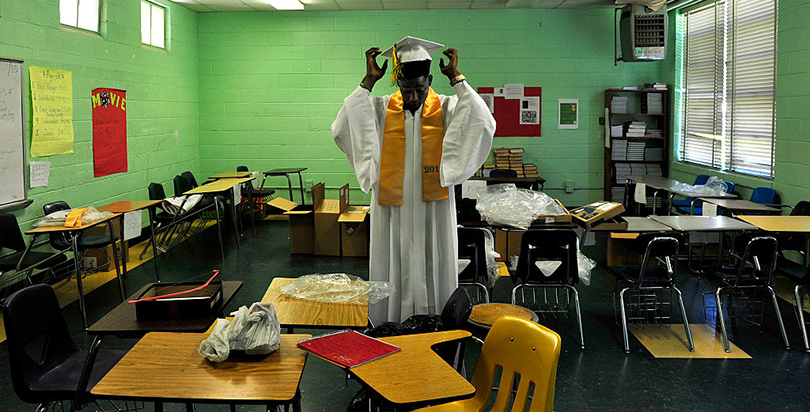Mesecar: 4 Ways Tennessee Is Prioritizing Personalized Learning in Its New ESSA Plan

Tennessee’s state education leaders have launched a plan that positions the state’s schools for a historic opportunity. The Volunteer State — more than any other state so far — is taking important steps to reframe accountability from a system of sanctions and compliance to one of aligned supports and authentic outcomes. Other states should take note as they devise their own accountability plans.
Tennessee was one of the first states to submit a plan for the federal Every Student Succeeds Act. The comprehensive approach prepared by Commissioner of Education Candice McQueen and her team represents a powerful blueprint for updating the state’s instructional programs.
The Tennessee Succeeds plan addresses achievement gaps with strategies informed by leading-edge school practices like personalized learning, which have begun to take root in diverse settings like Knox County Schools and Rocketship charter schools in Nashville. In addition, leaders like those at Tullahoma City Schools have pursued the use of innovative educational technology that incorporates cutting-edge digital tools into everyday learning.
Like every state in the union, Tennessee has large and persistent achievement gaps between poor and non-poor students, as well as between minority and non-minority students. On the National Assessment of Educational Progress (also known as “The Nation’s Report Card”), there is a nearly 25-point gap between poor and more-affluent students. A similar gap exists between white and black students in fourth-grade reading and eighth-grade math. While the differences in performance between white and Hispanic students have narrowed since 2011, the white-black achievement gaps have increased.
These gaps are evidence that large numbers of historically underserved students are not able to read at grade level or competently perform in math. Lags in either subject or grade can lead to academic struggles, the potential to drop out, and a lack of college or career readiness. Tennessee states in its ESSA plan that nearly half of all high school graduates do not go on to college and that first-time students in community colleges need at least one remedial course.
ESSA requires states to address achievement gaps, and Tennessee is tackling the challenge head-on. In its plan, the state emphasizes that “All Means All” by providing individualized support and opportunities to all students, particularly those who are behind. In fact, Tennessee states in its plan, “To support the department’s rigorous standards, aligned assessments, and strong accountability model, the department recognized the need for more personalization in the learning experiences for teachers and for students.”
The sad reality is that disproportionate numbers of poor and minority kids wind up in special education due to a lack of educational success. These students often slip through the cracks until their cumulative learning deficits become too large to ignore and their needs are finally addressed through individual attention mandated by federal disability law. Personalized learning holds real potential to turn this all-too-familiar pattern on its head by providing students immediate learning support when it is needed. Instead of waiting for students to fail before they get more time and attention, personalized learning is a just-in-time approach that can help teachers address academic deficiency before it snowballs into failure.
School accountability under the new plan will better support personalizing teaching and learning. In personalized learning models, students can learn at their own rates in different subjects with standards-aligned content. Among a number of changes, the state is proposing to use growth in student achievement over time to measure performance and reward academic growth at all levels of achievement, rather than just grade-level proficiency.
The state also lays out four areas of focus for piloting personalized learning approaches for students and teachers:
1. Blended learning for Algebra I: Launched last school year, this pilot was the state’s first personalized learning initiative and is set to double in size to 10,000 students for the 2017–18 school year. This effort is guided by evidence that technology can support teachers in delivering personalized instruction by leveraging data and quickly diagnosing student needs.
2. Predictive analytics: Personalized learning strategies often leverage technology to increase the efficiency of the learning cycle by using data trends to develop insights into learning patterns and streamline data-informed decisions.
3. Teacher micro-credentialing: This approach to professional development more closely aligns the acquisition of teaching knowledge and specific skills with identified needs, instead of the generic, one-size-fits-all approach. During the 2017–18 school year (the initiative’s second year), the state plans to reach up to 5,000 educators by partnering with districts to use micro-credentials.
4. Competency-based education: To support personalizing learning, the plan calls for encouraging initiatives that allow students to demonstrate mastery and advance through curricula and grades as mastery is achieved, informed by progress seen by some districts trying this approach and others outside Tennessee.
To take full advantage of the state’s ESSA plan, Tennessee districts will need to take action and put the state’s plans to good use. Tennessee is poised to make an innovation leap, using ESSA to launch efforts to personalize the education experience of every learner, combining effective teaching with adaptive technology to bring individualized instruction to every student.
And nationally, the Volunteer State has drafted a plan that its peers can — and should — seek to emulate within the context of their own unique educational ecosystems. There is no question the nation faces a national imperative to improve educational outcomes for all students, and Tennessee’s comprehensive approach to layering innovation and personalization into its strategic design seems destined to yield results.
Doug Mesecar is an adjunct scholar at the Lexington Institute. He previously served as a senior official at the U.S. Department of Education and in Congress.
Get stories like these delivered straight to your inbox. Sign up for The 74 Newsletter

;)